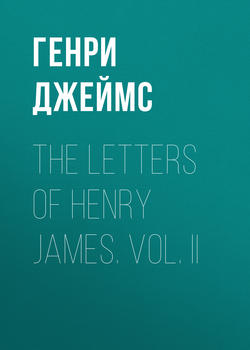Читать книгу The Letters of Henry James. Vol. II - Генри Джеймс, Henry Foss James - Страница 26
VI
Rye (continued)
(1904-1909)
To W. E. Norris
Оглавление16 Lewes Crescent,
Brighton.
December 23rd, 1906.
My dear Norris,
I think it was from here I wrote you last Christmas; by which I devoutly hope I don't give you a handle for saying: "And not from anywhere since then." But I am but too aware that it has been at the best a hideous record of silence and apparent gloom, and also fully feel that after such base laideurs of behaviour explanations, attenuations, protestations, are as the mere rustle of the wind and had really better be left unuttered. That only adds to the dark burden of one's consciousness when one does write; one crawls into the dear outraged presence with all one's imperfections on one's head. So I'll indulge, at any rate, in no specific plea—but only in that general one of the fact that the letter-writing faculty within me has become extinct through increasing age, infirmity, embarrassment (the spelling faculty, even, you see, almost extinct,) and general demoralization and desolation. Twenty reproachful spectres rise up before me—out of whom your fine sad face is only the most awful. All I can say for myself (and you) is that among these feeble reparations that I am trying to make in the way of "hardy annuals"—hardy in the sense, I fear, of a sort of shameful brazenness—this "Christmas letter" to you takes absolute precedence. I wrote indeed to Rhoda Broughton a couple of days since, from town, but that was a melancholy matter on the occasion of my having gone up to poor dear Hamilton Aïdé's memorial service (where I didn't see her, though she may have been present, and of which I thought she would care for some little account. It was a very beautiful and touching musical service. But I haven't seen her for a long time, alas!—amid these years of more and more interspaced—and finished—occasions.) Of course I am hoping that this will lie on your table on Xmas morning—in all sorts of charming company, and not before and not after. But it's difficult to time communications at this upheaved season, especially from another (non-London) province, and I trust to the happy hazard, though still a little ruffled by a sense of the break-down of things (the "public services") that compelled me yesterday, coming down here from Victoria, to be shoved into (as the only place in the train) the small connecting-space between two Pullmans, where I stuck, all the way, in a tight bunch of five or six other men and three portmanteaux and boxes: quite the sort of treatment (one's nose half in the w.c. included) that the English traveller writes from Italy infuriated letters to the Times about. I figure you at all events exempt from any indignity of movement (and the conditions of movement nowadays almost all include indignity) and still sitting up on your Torquay slope as on a mild Olympus and with this strife of circulating humans far below you. But when I reflect that I don't know, for certain, any of your actualities I reflect with a crimson countenance on the months that have elapsed. I have before me as I write a beautiful letter from you, of the date of which nothing would induce me to remind you—but that is not quite your contemporary history.... Putting your own news at its quietest, however, my own runs it close—for save for this small episode (a stay with some old and intensely tranquil American friends established here for the ending of their days,) and putting aside a few days at a time in London, which I find periodically inevitable, and even quite like, I haven't stirred for ages from my own house, the suitability of which to my modest scheme of existence grows fortunately more and more marked. I spent last summer there—the most beautiful of one's life I think—without the briefest of breaks—and that gregarious time is the one at which I like least to circulate. The little place, alas, becomes itself—like all places save Torquay, I judge—more and more gregarious: and there were a good many days when even my own small premises bristled too much with the invader. But there is a great virtue in sitting tight—you sit out many things; even bores are, comparatively speaking, loose; and I had a blest sort of garden (by which I'm far from meaning gardening) summer. What it must have been beside your sapphire sea! I return, at any rate, in a few days, to sit tight again, till early in February, when there are reasons for my probably going for five or six weeks to Paris; and even possibly—or impossibly—to Rome; one of the principal of these being that the prospect fills me with a blackness of horror that I find really alarming as a sign of moral paralysis and abjection; so that I ought to try to fly in the face of it. But I shall fly at the best, I fear, very low!…
I needn't tell you how much I hope and pray that this may find you, as they say, in health. There's an icy blast here to-day—yet I take for granted that if it weren't Sunday you would be doing something very prodigious and muscular in the teeth of it. The prize (of long activity and sweet survival) is with those whose hardness is greater than other hardnesses. And yours is greater than that of the sea-wave and all the rest of opposing nature—though I make this imputation only on behalf of your sporting resources. I appeal to the softest corner of the softest part of the rest of you to make before too long some magnanimous sign to yours very constantly,
HENRY JAMES.
